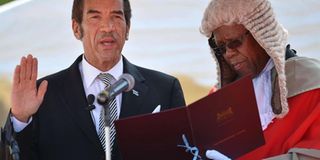Botswana’s leader begins second term

Botswana’s President Ian Khama takes the oath of office during a ceremony as he was sworn in for his second term on October 28, 2014 in Gaborone, after winning re-election with a reduced majority. PHOTO | MONIRUL BHUIYAN |
What you need to know:
- Mr Khama’s Botswana Democratic Party has ruled the diamond-rich southern African nation since independence in 1966.
- Khama took the oath of office at parliament, in a ceremony followed by a 21 gun salute and a flypast by military aircraft.
GABORONE, Botswana
Botswana’s President Ian Khama was sworn in for his second term on Tuesday after winning re-election with a reduced majority, pledging to intensify efforts to diversify the economy and eradicate poverty.
Mr Khama’s Botswana Democratic Party has ruled the diamond-rich southern African nation since independence in 1966, but many voters complained of growing economic strain and unemployment.
The 61-year-old Khama took the oath of office at parliament, in a ceremony followed by a 21 gun salute and a flypast by military aircraft.
In his inaugural speech, Mr Khama said “the key to achieving sustainable diversified economic growth and social security lies in the development of our people” through improved education and skills.
He said the government would focus on “emerging opportunities within the mineral sector” and development of other sectors such as agriculture and tourism.
Botswana produces around 30 per cent of the world’s diamonds by value, and received a boost in 2012 when mining giant De Beers moved its diamond sorting business to the capital Gaborone.
Mr Khama said the “ongoing success in establishing our country as a global hub to market diamond processing” should serve as a “beacon of what we can also accomplish in other areas”.
Although seen as one of Africa’s success stories, Botswana has recorded rising unemployment since 2009 as the global economic crisis sent diamond prices falling.
Mr Khama’s party won 37 of the 57 elected seats in parliament in Friday vote’s — eight fewer than in the last election in 2009.
A newly formed coalition, Umbrella for Democratic Change, took 17 seats to become the main opposition group after making inroads in urban areas.
SON OF FIRST PRESIDENT
Mr Khama, the son of the country’s first president, Seretse Khama, said poverty eradication, job creation and food security would also form part of the new government’s focus.
During the election campaign, Khama admitted the failure of his government to stop unemployment rates from rising.
International observers were satisfied that the polls had been free, although questions were raised over election funding and the poor representation of female candidates in the party lists.





